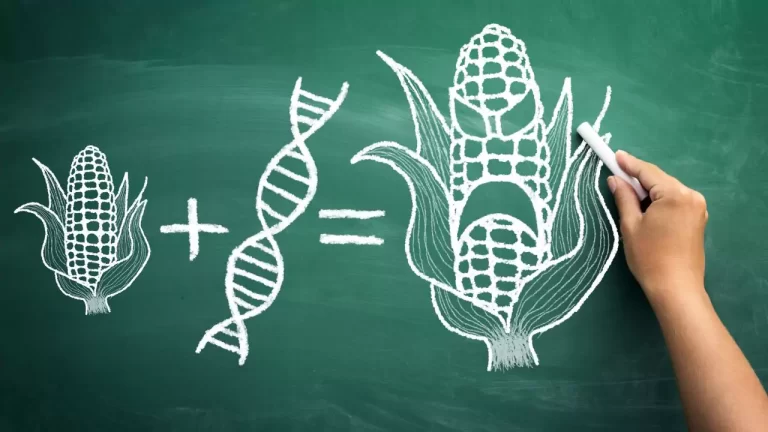GMOs, or genetically modified organisms, are plants or animals that have been altered at the DNA level to enhance certain traits, such as pest resistance, drought tolerance, or nutritional value. GMOs are widely used in human and animal food production, but they are also controversial and potentially harmful.
GMOs in Cat Food
GMOs in cat food are a concern for many cat owners who want to provide their feline companions with the best nutrition possible. GMOs may pose a threat to your cat’s health by altering their organ functions, immune response, gene expression, and susceptibility to diseases. Some health problems linked to GMO consumption in animals include allergies, dermatitis, irritable bowel syndrome, inflammatory bowel disease, recurring vomiting and diarrhea, and abnormalities in liver, pancreas, and immune system function.
The FDA does not mandate human or pet food companies to disclose GMOs on product labels, leaving you uncertain about whether your cat consumes them. Corn, soy, sugar, canola, and cotton are the prevalent GMO crops, commonly used as ingredients or fillers in cat food. Additional GMO foods, such as papaya, zucchini, yellow squash, and rice, may also be present in cat food.
The Potential Health Risks of GMOs in Cat Food
GMOs in cat food may have several negative effects on your cat’s health, such as:
- Allergies: GMOs may introduce new allergens or increase the allergenicity of existing ones, causing your cat to develop allergic reactions such as itching, sneezing, wheezing, or anaphylaxis.
- Dermatitis: GMOs may affect your cat’s skin health by disrupting their natural barrier function, making them more prone to infections, inflammation, and irritation.
- Irritable bowel syndrome: GMOs may alter your cat’s gut microbiome, which is essential for digestion, immunity, and mood regulation. This may lead to symptoms such as gas, bloating, cramps, constipation, or diarrhea.
- Inflammatory bowel disease: GMOs may trigger or worsen chronic inflammation in your cat’s intestinal tract, resulting in conditions such as colitis or Crohn’s disease.
- Recurring vomiting and diarrhea: GMOs may cause your cat to experience frequent episodes of vomiting and diarrhea due to their toxic effects on the liver and kidneys.
- Abnormalities in liver, pancreas, and immune system function: GMOs may interfere with your cat’s metabolic processes and immune response by altering their gene expression and organ functions. This may increase their risk of developing diseases such as diabetes, cancer, or autoimmune disorders.
Common GMO Ingredients Found in Commercial Cat Food
Some of the most common GMO ingredients that you may find in commercial cat food include:
- Corn: Corn is often used as a cheap source of carbohydrates and protein in cat food, but it is also one of the most genetically modified crops in the world. Corn may contain genes from bacteria or viruses that make it resistant to herbicides or insects. Corn may also be contaminated with aflatoxins, which are carcinogenic substances produced by fungi that grow on corn.
- Soy: Soy is another common ingredient in cat food that provides protein and fat. However, soy is also heavily modified to withstand herbicides or produce its own insecticides. Soy may also contain phytoestrogens, which are plant compounds that mimic estrogen hormones and may disrupt your cat’s endocrine system.
- Sugar: Sugar is often added to cat food to enhance its palatability and shelf life. However, sugar may come from genetically modified sugar beets or sugar cane, which may contain genes from bacteria or viruses that make them resistant to herbicides or pests. Sugar may also contribute to obesity, diabetes, and dental problems in your cat.
- Canola: Canola is a type of rapeseed that is used to produce oil and meal for animal feed. Canola is also genetically modified to tolerate herbicides or produce its own pesticides. Canola may contain erucic acid, which is a fatty acid that may cause heart damage in animals.
- Cotton: Cotton is not a food product, but it is used to produce cottonseed oil and meal for animal feed. Cotton is also genetically modified to resist herbicides or insects. Cotton may contain gossypol, which is a toxic substance that may impair your cat’s liver and reproductive functions.
How to identify and avoid GMOs in Cat food?
The best way to identify and avoid GMOs in cat food is to look for foods that are USDA-certified organic. Organic foods are prohibited from using GMOs and must follow strict standards of production and processing. Organic foods must also be free of synthetic pesticides, fertilizers, hormones, antibiotics, and artificial additives.
If you cannot find a USDA organic cat food that your cat will eat, you can also look for foods that have the Non-GMO Project Verified seal. This seal indicates that the food has been tested and verified to be free of GMOs by an independent third-party organization.
Another option is to avoid foods that contain corn, soy, sugar, canola, cotton, or any other ingredients that are likely to be genetically modified. You can also check the brand’s website or contact their customer service department to ask about their GMO policy and practices.
Benefits of feeding your cat GMO-free Food
Feeding your cat GMO-free food may have several benefits for their health and well-being, such as:
- Reducing the risk of allergies, dermatitis, irritable bowel syndrome, inflammatory bowel disease, recurring vomiting and diarrhea, and abnormalities in liver, pancreas, and immune system function: By avoiding GMOs, you may prevent or alleviate some of the health problems that have been associated with GMO consumption in animals.
- Supporting your cat’s natural barrier function, gut microbiome, metabolic processes, and immune response: By feeding your cat natural and organic foods, you may help them maintain their normal physiological functions and protect them from diseases.
- Providing your cat with optimal nutrition: By choosing high-quality and biologically appropriate foods for your cat, you may ensure that they receive the nutrients they need for their growth, development, and maintenance.
- Enhancing your cat’s palatability and satisfaction: By offering your cat tasty and varied foods that suit their preferences and needs, you may improve their appetite and enjoyment of their meals.
Alternative Options for GMO-free Cat Food
If you are looking for some alternative options for GMO-free cat food, here are some suggestions:
- Homemade cat food: You can make your own cat food at home using fresh, organic, and human-grade ingredients. This way, you have full control over what goes into your cat’s food and you can customize it according to their needs and preferences. However, homemade cat food requires careful planning, preparation, and supplementation to ensure that it meets your cat’s nutritional requirements. You should consult with a holistic veterinarian or a certified pet nutritionist before making any changes to your cat’s diet.
- Raw cat food: You can feed your cat raw meat, bones, and organs from organic and grass-fed animals. Raw food may provide your cat with the most natural and biologically appropriate diet for their species. However, raw food also carries some risks of bacterial contamination, parasites, choking hazards, and nutritional imbalances. You should follow proper hygiene practices when handling raw food and supplement it with essential vitamins and minerals. You should also consult with a holistic veterinarian or a certified pet nutritionist before switching your cat to a raw diet.
- Freeze-dried or dehydrated cat food: You can feed your cat freeze-dried or dehydrated food made from organic and human-grade ingredients. Freeze-dried or dehydrated food preserves the nutrients and flavor of fresh food without the need for refrigeration or cooking. However, freeze-dried or dehydrated food requires rehydration before feeding and may be more expensive than other types of food. You should also check the label for any additives or preservatives that may harm your cat.
Conclusion
GMOs in cat food are a potential source of health problems for your cat. They may affect their organ functions, immune response, gene expression, and susceptibility to diseases. To avoid GMOs in cat food, you can look for foods that are USDA-certified organic, Non-GMO Project Verified, or free of common GMO ingredients. You can also make your own cat food at home, feed your cat raw food, or choose freeze-dried or dehydrated food. By feeding your cat GMO-free food, you may improve their health and well-being.






